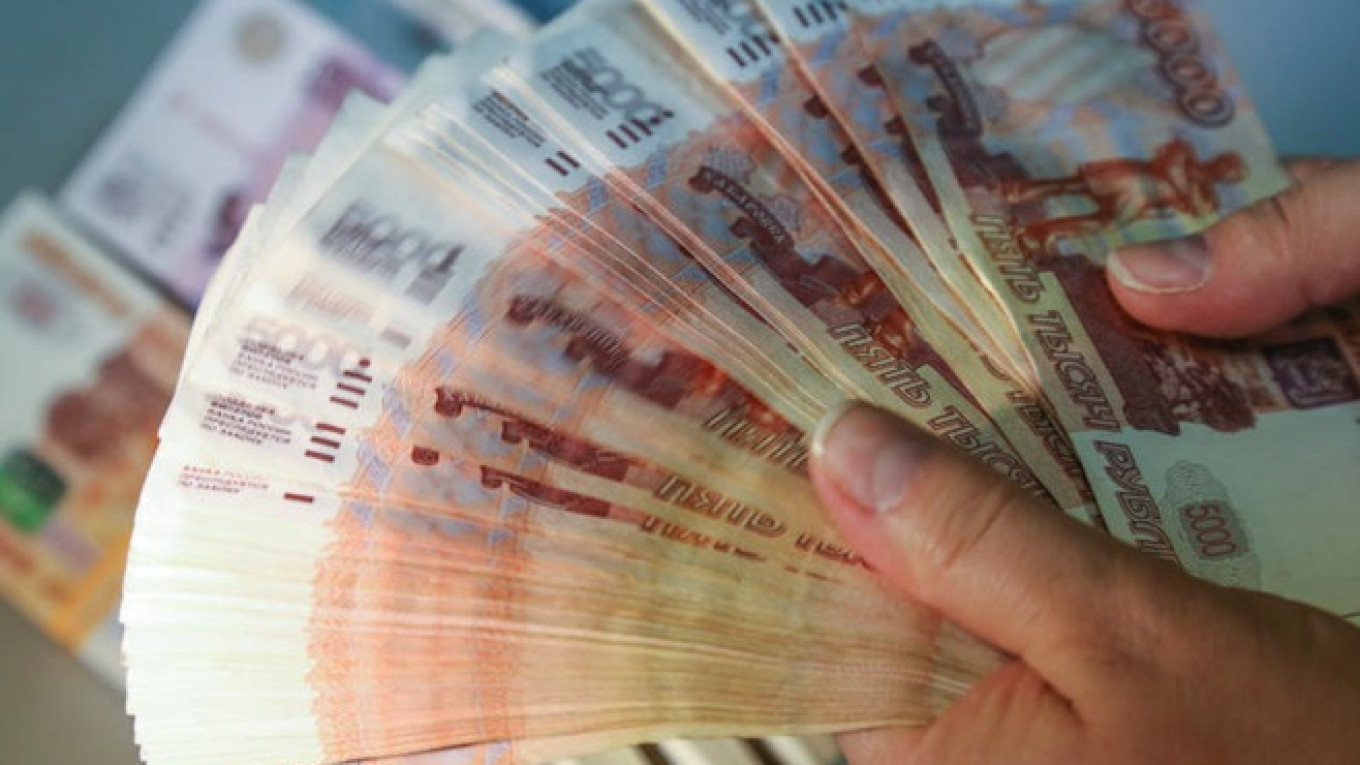The ruble strengthened sharply Friday amid what appeared to be multiple large interventions by the Central Bank a day after President Vladimir Putin said financial authorities should act against “speculators” driving down the value of the Russian currency.
The Central Bank refrained from any intervention after it let the ruble free-float on Nov. 10, but returned to the market this week and has spent at least $2.6 billion defending the currency since Monday.
The ruble jumped almost four percent Friday as trading opened, rising to 52.40 against the U.S. dollar. It weakened gradually through the afternoon on the back of falling oil prices before jumping again at 6 p.m., this time by 3 percent to 52.48, according to data from the Moscow Exchange.
The sharp gains went against the ruble's usual movement with the Brent oil price, which extended losses Friday to drop below $69 a barrel.
“Looks like the Central Bank is at it again,” analysts at Bank of America Merrill Lynch wrote in an e-mailed note to investors Friday morning.
Two currency traders said the Central Bank was selling currency, the Reuters news agency reported.
Some observers said the pattern of ruble surges this week suggested that the Central Bank was intervening to stop the ruble slipping below 54 versus the dollar, or about 60 rubles against the euro-dollar basket, the currency benchmark used by the regulator.
“For the last four days the Central Bank has not let the ruble go beyond 60 rubles to the bi-currency basket for any long period of time,” VTB24 analyst Alexei Mikheyev said in a note to investors.
The Central Bank has said that it spent $700 million on Monday and $1.9 billion on Wednesday to prop up the currency. The regulator releases data on interventions with a two day time-lag.
Analysts have also suggested that the Central Bank intervened Thursday as Putin gave his state of the nation address in the Kremlin.
When speaking to assembled dignitaries, Putin said authorities knew the identity of speculators seeking to earn on the ruble's fall and that it was time for the Central Bank and the government to act to stop currency manipulation.
Finance Minister Anton Siluanov said later that the government would work with large commodity exporters to regulate their ruble purchases.
Before floating the ruble last month, the Central Bank was obliged to make regular interventions to keep the currency within a proscribed trading corridor, spending $70 billion of Russia's foreign currency reserves since January.
But criticism of the regulator's perceived inactivity has mounted in recent weeks as ruble falls intensified.
“There has been heavy political pressure on the institution [the Central Bank] to intervene,” Timothy Ash, an emerging market analyst at Standard Bank, said in an e-mailed note to investors Friday.
Russia has about $420 billion of foreign currency still available, according to data on the Central Bank's website. Putin said last month that the country will not “mindlessly” burn through its reserves in defense of the ruble.
Battered by falling oil prices, which have collapsed 40 percent since their June highs, Western sanctions on Moscow and a tanking Russian economy, the ruble has plunged 40 percent this year.
The regulator's first intervention Monday was prompted by the ruble's largest one-day fall in sixteen years. The currency has fallen 15 percent in the last two weeks.
In a statement posted online Thursday the Central Bank said that the ruble was divorced from its fundamental value and that exchange rate volatility was posing a risk to the stability of the Russian financial system.
The Central Bank will meet on Dec. 11 to decide whether to raise interest rates in a bid to support the ruble and reduce capital outflow. The regulator has raised rates by 4 percent since February to 9.5 percent.?
Contact the author at [email protected]
A Message from The Moscow Times:
Dear readers,
We are facing unprecedented challenges. Russia's Prosecutor General's Office has designated The Moscow Times as an "undesirable" organization, criminalizing our work and putting our staff at risk of prosecution. This follows our earlier unjust labeling as a "foreign agent."
These actions are direct attempts to silence independent journalism in Russia. The authorities claim our work "discredits the decisions of the Russian leadership." We see things differently: we strive to provide accurate, unbiased reporting on Russia.
We, the journalists of The Moscow Times, refuse to be silenced. But to continue our work, we need your help.
Your support, no matter how small, makes a world of difference. If you can, please support us monthly starting from just $2. It's quick to set up, and every contribution makes a significant impact.
By supporting The Moscow Times, you're defending open, independent journalism in the face of repression. Thank you for standing with us.
Remind me later.


